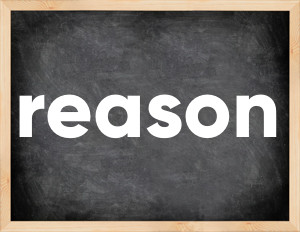 The English verb 'reason' is pronounced as [ˈriːzn].
The English verb 'reason' is pronounced as [ˈriːzn].
Related to:
3 forms of verb reason: Infinitive (reason), Past Simple - (reasoned), Past Participle - (reasoned).
Here are the past tense forms of the verb reason
👉 Forms of verb reason in future and past simple and past participle.
❓ What is the past tense of reason.
Reason: Past, Present, and Participle Forms
| Base Form | Past Simple | Past Participle |
|---|---|---|
| reason [ˈriːzn] |
reasoned [ˈriːzənd] |
reasoned [ˈriːzənd] |
What are the 2nd and 3rd forms of the verb reason?
🎓 What are the past simple, future simple, present perfect, past perfect, and future perfect forms of the base form (infinitive) 'reason'?
Learn the three forms of the English verb 'reason'
- the first form (V1) is 'reason' used in present simple and future simple tenses.
- the second form (V2) is 'reasoned' used in past simple tense.
- the third form (V3) is 'reasoned' used in present perfect and past perfect tenses.
What are the past tense and past participle of reason?
The past tense and past participle of reason are: reason in past simple is reasoned, and past participle is reasoned.
What is the past tense of reason?
The past tense of the verb "reason" is "reasoned", and the past participle is "reasoned".
Verb Tenses
Past simple — reason in past simple reasoned
(V2).
Future simple — reason in future simple is reason (will + V1).
Present Perfect — reason in present perfect tense is
reasoned
(have/has + V3).
Past Perfect — reason in past perfect tense is
reasoned
(had + V3).
reason regular or irregular verb?
👉 Is 'reason' a regular or irregular verb? The verb 'reason' is .
Examples of Verb reason in Sentences
- We tried to reason with them (Past Simple)
- And so, John reasoned that the planet is hundreds of times farther than expected (Past Simple)
- He could not reason his actions (Past Simple)
- Try to reason me why I should give you money (Present Simple)
- She had already begun to reason out a plan of escape and to consider all the possibilities. (Past Perfect)
- This assumption can be reasoned by the results of numerous studies (Present Simple)
- School-age children in the course of the game will learn how to reason correctly and convincingly. (Past Perfect)
- Not going to waste any more time in an argument, I turned away and began to reason over a plan of possible and necessary actions. (Past Simple)
- It should be noted that he was distinguished by a rare charm and easily able to reason people if they wanted. (Past Simple)
- I hope I don't have to reason otherwise today. (Present Simple)